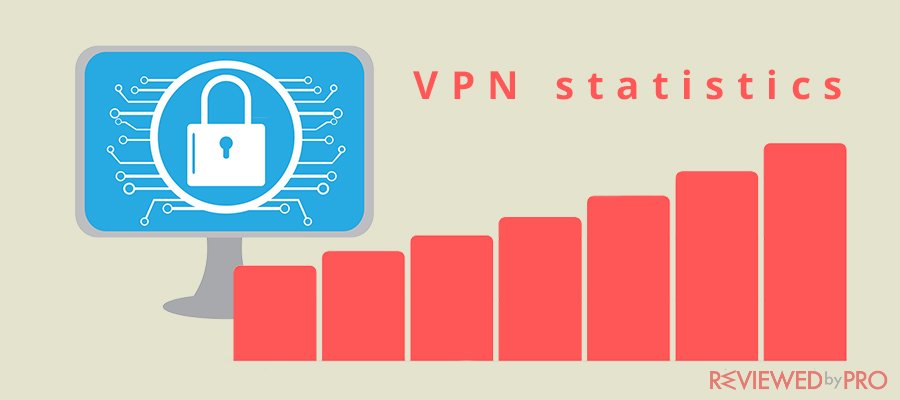
We have reviewed a number of various VPN statistics websites and systematized the key highlights about the entire VPN service. In this article you will find the data and our insights about the statistics of vpn market growth, purpose of use, demographic data and other interesting information.
The most important VPN usage statistics aspects
There is a wide variety of statistical information on VPN usage available on the Internet, but we decided to further explore and understand the portrait of a standard VPN user using demographic analytics data.
VPN market overview and statistics
Due to the growing number of internet users in the world, the market for VPN services is also growing in parallel. More and more users want to remain anonymous online or access blocked content in their country. According to the data of Statista.com[1] we have made an infographics where you can compare the growth.
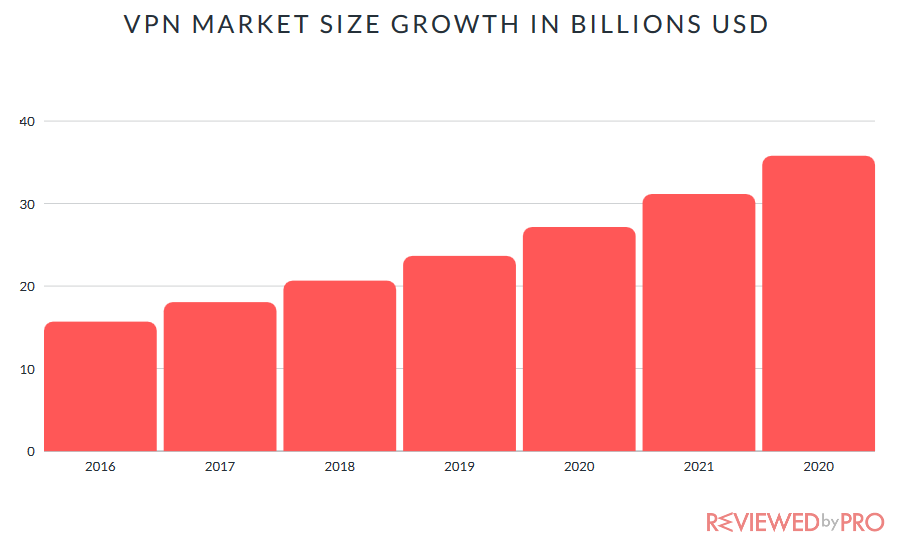
The graph and table below show the data that shows how the VPN market has changed over the years. As we can see by the numbers, in 2016, the VPN market was about $ 15 billion, and that number has been growing steadily. If you compare the data from 2016 to the present, the VPN market has grown by more than 200 percent. Such a sharp leap in the growth of the VPN services sector is a testament to the growing awareness of people about online privacy and security.
| Year | Worldwide market size |
| 2016 | $15.64 billions |
| 2017 | $18.1 billions |
| 2018 | $20.6 billions |
| 2019 | $23.6 billions |
| 2020 | $27.1 billions |
| 2021 | $31.1 billions |
| 2022 | $35.73 billions |
The rapid growth of the VPN services sector has also been driven by geo-location bans on accessing online content. By 2030, VPN market growth is projected to double again to $ 60-70 billion.
VPN statistics by VPN purpose of use
In this section of the article, we want to introduce you to the main purposes why users use the VPN service. Most users choose VPNs to unblock entertainment content[2]. The rest of the users choose VPN for other purposes. Read on to find out who else users are using VPNs with.
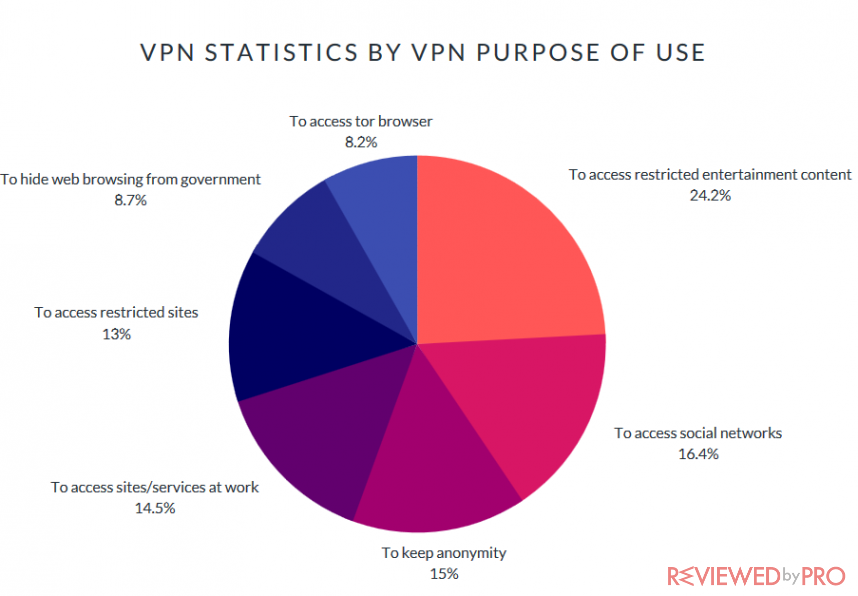
- Based on statistics, we can assume that the most popular purpose of using a VPN is to access prohibited or otherwise restricted online entertainment content. As many as 25% of VPN users use this service for this purpose only. We mean video games, online video streaming platforms like Netflix, Amazon or Dysney +. VPN users also choose this service to use it for torrenting.
- Internet users also choose a VPN service when they want to access banned social networking platforms in their country. As in China, for example, the use of the social page Facebook is banned, then a VPN is perfect for unblocking this page. As many as 16.4% of VPN users use a VPN for this purpose alone.
- Another portion of VPN users, who make up 15%, say they use VPNs to ensure their anonymity while browsing the Internet. In other words, VPN users do not want their ISP or government organizations to track their online activities.
- 14.5% of users use VPNs to access banned sites in their workplace or educational institutions. As you know, a large number of employers do not want their employees to use social networks or other entertainment websites, so they block them on the company's internal network. The only way to access them is with a VPN.
- 13% of VPN users say they need this service to access banned sites. As an example, some countries ban online gambling and other adult websites, so without VPN you will not be able to access them.
- 8.7% of VPN users do not want the government to see what websites they are opening, so they tend to change their IP and encrypt their browsing data.
- 8.2% of VPN users use the service to access the Tor browser and further disguise their online presence.
| Reason | %age |
| To access restricted entertainment content | 24.2% |
| To access social networks or news services | 16.4% |
| To keep anonymity while browsing | 15% |
| To access sites/services at work | 14.5% |
| To access restricted sites | 13% |
| To hide web browsing from government | 8.7% |
| To access tor browser | 8.2% |
VPN statistics of VPN usage by age
Further analysis of the statistics revealed that VPN users are clearly distributed by age group. The majority of VPN users[3] (68%) are younger users (16-34 years old). Below you will find more detailed statistics with our insights and reflections.
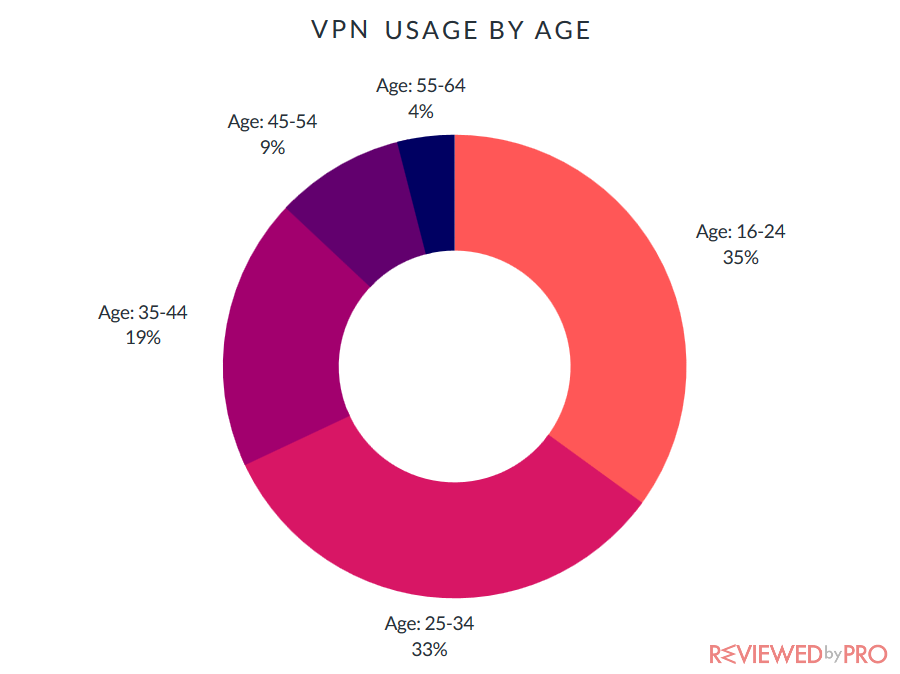
As we can see from the data provided, the majority of VPN users (35%) are young people aged 16-24. Consumers aged 25-34 make up a slightly smaller but also very high statistical share (33%). By combining these two age groups into one, we can conclude that the main users of VPNs are young and very young people who want to access online entertainment content.
Another group of VPN users, ranging in age from 34 to 44, accounts for 19%. This is twice less than the user groups previously talked about.
Age groups between 45-54 (9%) and 55-64 (4%) account for the smallest share of VPN users. Such figures say that older consumers are less technologically advanced and find it more difficult to take advantage of this type of technology.
| Age | %age of VPN users |
| 16-24 | 35% |
| 25-34 | 33% |
| 35-44 | 19% |
| 45-54 | 9% |
| 55-64 | 4% |
In summarizing the distribution of VPN users by age groups, young people dominate in the first place. They are curious, innovative and much more interested in technology than older consumers.
VPN statistics by usage by gendre
This section of the article provides information on the statistical distribution of VPN users by gender[4].
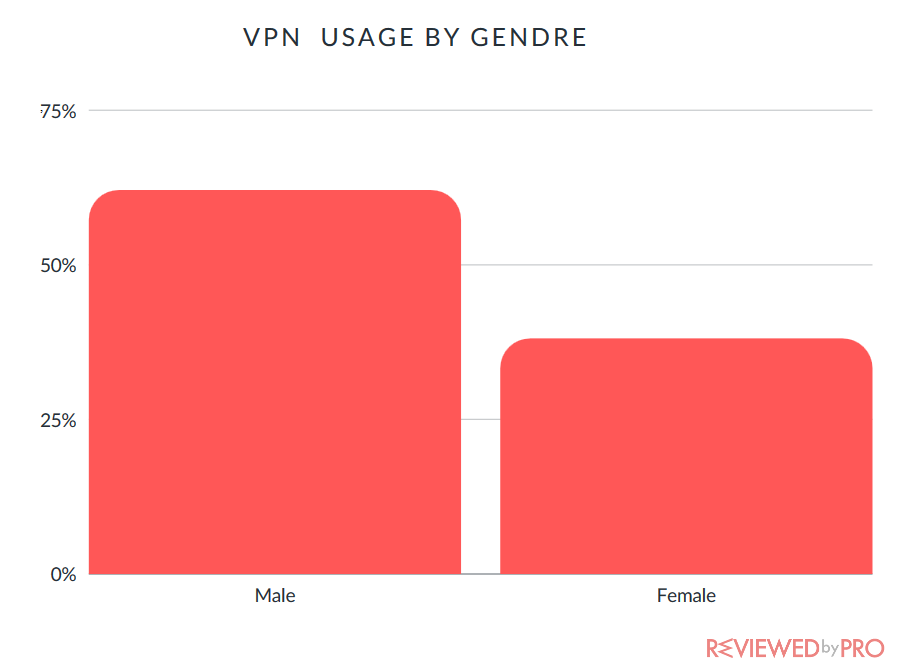
The demographic distribution of VPN users by gender is dominated by men. Men make up 62% of all VPN user statistics.
Meanwhile, the circle of female consumers is much smaller. The distribution of women in the VPN user group is 38%, which is twice less than men.
We believe this is due to the fact that men are more interested in technology and are more likely to seek technological solutions by bypassing various online restrictions or disguising their identities.
| Gender | % |
| Male | 62% |
| Female | 38% |
Dear women, You must take a little more interest in online privacy and security!
VPN statistics by frequency of use
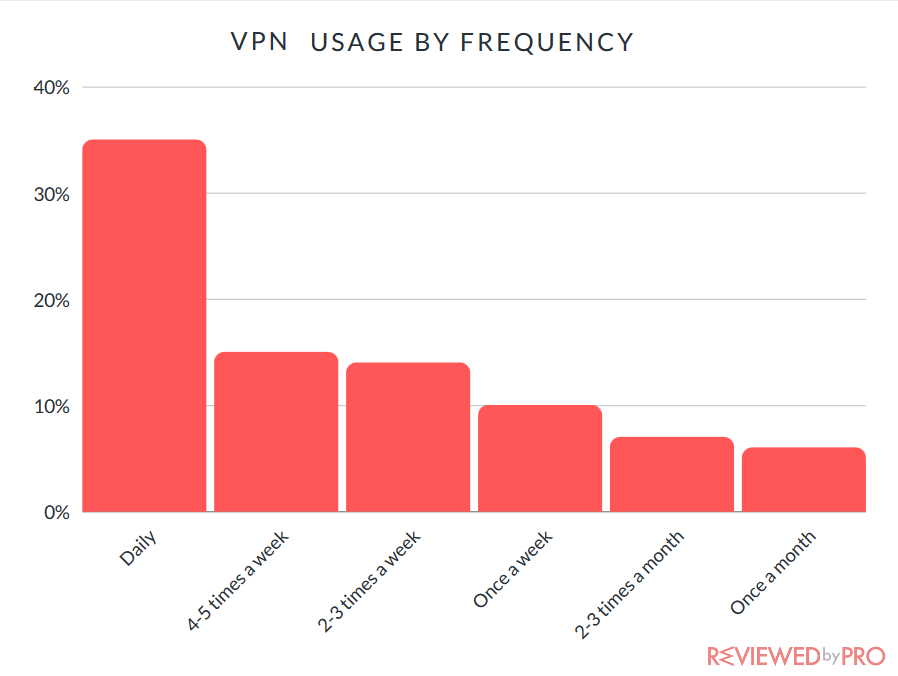
- The majority of VPN users (35-42%) use VPN service for their daily needs. This means that users are constantly trying to mask their IP addresses and encrypt their browsing data for greater security and privacy. Mobile phone users are leading the way in this area. As many as 42% of them use the service on a daily basis.
- 15% of VPN users use the service 4-5 times a week. It can be assumed that this is a group of users who use the service at work or in an educational institution.
- 14% of VPN users use the service 2-3 times a week.
- 10% of VPN users use the service only once a week.
- Another group of VPN users (13%) use this service 2-3 times a month or even less often.
| Frequency | VPN users ( Desktop) | VPN users ( Mobile) |
| Daily | 35% | 42% |
| 4-5 times a week | 15% | 13% |
| 2-3 times a week | 14% | 11% |
| Once a week | 10% | 9% |
| 2-3 times a month | 7% | 6% |
| Once a month | 6% | 4% |
VPN statistics by the top 10 countries
The countries with the highest number of VPN users are mainly Asian countries. This is due to high online censorship by the government. In these regions, it is impossible to reach the most popular sites like Facebook, Youtube, Twitter and others. Not surprisingly, due to such online caesareans and restrictions, these countries lead in VPN sales.
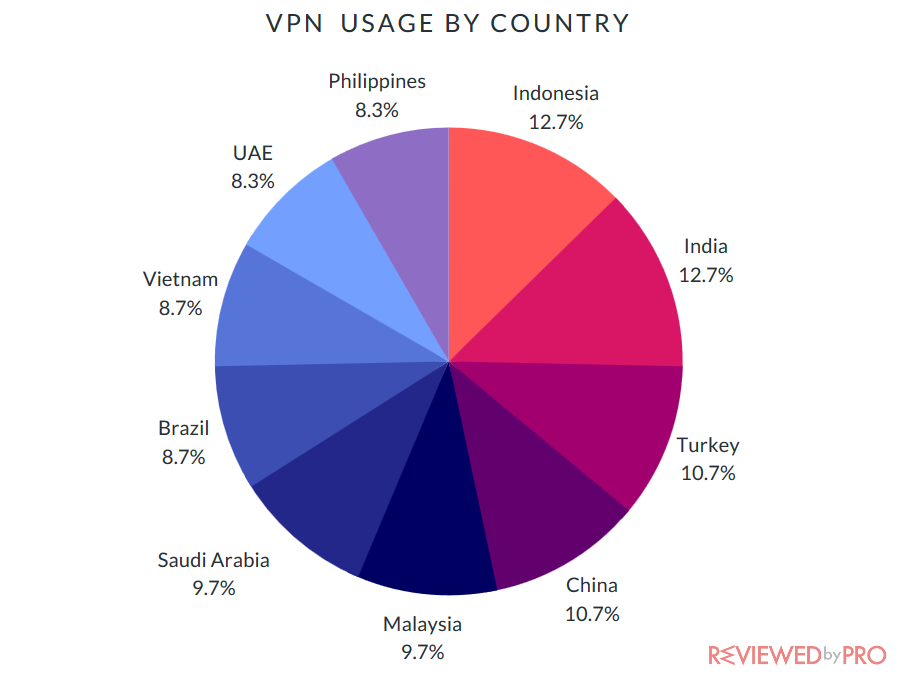
As you can see from the data provided, all the countries listed have a fairly similar percentage distribution. We would prefer to single out Indonesia[5], which is subject to extremely strict online censorship and it is difficult for islanders to reach any better known site.
Exactly the same figures apply in India. The country also has strict online censorship and people are forced to use a VPN service to view regular websites.
| Number | Country | VPN usage by country in % |
| 1 | Indonesia | 12.7% |
| 2 | India | 12.7% |
| 3 | Turkey | 10.7% |
| 4 | China | 9.7% |
| 5 | Malaysia | 9.7% |
| 6 | Saudi Arabia | 8.7% |
| 7 | Brazil | 8.7% |
| 8 | Vietnam | 8.7% |
| 9 | UAE | 8.3% |
| 10 | Philippines | 8.3% |
To sum up the statistics of VPN usage
So to sum up the whole article, you can create a statistical portrait of a VPN user who is male, fairly young, lives in an Asian country, and uses VPNs to access entertainment content sites. Of course, these data are constantly evolving and statistics may change beyond recognition over time. Americans and Europeans have already felt the benefits of VPN and consumption on these continents is growing rapidly.
American security agencies are constantly expanding their activities and over time, more and more citizens will be monitored. This affects not only the American people, but also Europeans. So, as forecast, sales of VPN services will only increase and double. Take care of your online security and privacy.
Recommended VPNs
| Options |  |
 |
 |
| Location | B.V.I. Islands | Panama | Romania |
| Servers | 3000+ | 5000+ | 3500+ |
| Countries | 160 | 60 | 60 |
| Supported devices | 5 | 6 | 7 |
| Torrenting | ✔ | ✔ | ✔ |
| U.S.Netflix | ✔ | ✔ | ✔ |
| Encryption and protocols | |||
| AES-256 | ✔ | ✔ | ✔ |
| OpenVPN | ✔ | ✔ | ✔ |
| PPTP | ✔ | ✔ | ✔ |
| L2TP | ✔ | ✔ | ✔ |
| SSTP | ✔ | ✔ | ✔ |
| IPsec | ✔ | ✗ | ✔ |
| Internet connection speed | |||
| Download speed | 83.15 | 72.33 | 71.10 |
| Upload speed | 35.18 | 48.18 | 36.45 |
| Security features | |||
| SSL | ✔ | ✔ | ✔ |
| No-Log | ✔ | ✔ | ✔ |
| Kill Switch | ✔ | ✔ | ✔ |
| Ad-Blocking | ✔ | ✔ | ✔ |
| Double encryption | ✗ | ✔ | ✗ |
| IP Leak protection | ✔ | ✔ | ✔ |
| Operating systems | |||
| Windows | ✔ | ✔ | ✔ |
| Mac | ✔ | ✔ | ✔ |
| Android | ✔ | ✔ | ✔ |
| Linux | ✔ | ✔ | ✔ |
| iOS | ✔ | ✔ | ✔ |
| XBox | ✔ | ✔ | ✔ |
| PS4 | ✔ | ✔ | ✔ |
| Browser extension | |||
| Chrome | ✔ | ✔ | ✔ |
| Firefox | ✔ | ✔ | ✔ |
| Other features | |||
| Router support | ✔ | ✔ | ✔ |
| Free version | ✗ | ✗ | ✗ |
| Accepts Bitcoins | ✔ | ✔ | ✔ |
| Money back guarantee | 30 days | 30 days | 45 days |
| Read a review | review | review | review |
| Paid version from | $6.67/month | $3.49/month | $2.75/month |
| Try |  |
    |
    |
- ^ Arne Holst. Size of the virtual private network (VPN) market worldwide from 2016 to 2022. Global virtual private network market size 2016-2022.
- ^ Law Insider. Definition of Digital Entertainment Content. Definition of Digital Entertainment Content.
- ^ Globalwebindex. VPN users around the world. VPN users around the world.
- ^ J. Clement. Share of internet users worldwide who have used a VPN in the past month as of 1st quarter 2018, by gender. Global VPN usage reach, by gender.
- ^ Go-Globe. The State of VPN Usage – Statistics and Trends. VPN usage statistics in Indonesia and India.




